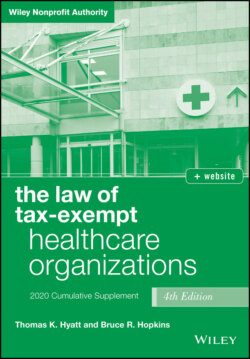Читать книгу The Law of Tax-Exempt Healthcare Organizations - Bruce R. Hopkins - Страница 21
На сайте Литреса книга снята с продажи.
NOTES
Оглавление1 26.1 Priv. Ltr. Rul. 201505042.
2 26.2 Priv. Ltr. Rul. 201932017.
3 30.1 Parks v. Commissioner, 145 T.C. 278, 309 (2015) aff'd, 717 Fed. Appx. 712 (9th Cir. 2017).
4 185 The use of one or more PARCs was announced in mid‐2015, in a memorandum from the Director, Exempt Organizations Division (TEGE‐04‐0715‐0018, July 17, 2015), where it was stated that a PARC consists of three General Schedule grade 14 managers, who will receive “appropriate training” and serve as a committee member for two years. A PARC is to review and recommend referrals for audit in an “impartial and unbiased manner.” The “inventory volume of political activities referrals” will determine the number of PARCs established and the time commitment required of the members of a PARC. It is not known whether the PACI is continuing by that name and thus whether use of PARCs is an element of an ongoing PACI.
5 186 TIGTA, “Review of the Processing of Referrals Alleging Impermissible Political Activity by Tax‐Exempt Organizations” (2019‐10‐006 (Oct. 4, 2018)).
6 186.1 See § 7.8, text accompanied by infra note 220.1.
7 186.2 Executive Order No. 13798.
8 186.3 This executive order in four instances frames its reach as being (as it must) within the law and in addition states that it is designed to “further compliance” with applicable statutory law. The prohibition, from an exemption standpoint, on political campaign activity by charitable organizations, including churches, sometimes referred to as the “Johnson Amendment,” is law. Therefore, from the standpoint of tax‐exempt churches and other religious entities and political campaign speech, it is hard to see what this executive order accomplishes for them. That would be the case if the order stopped there. But it does not.The order provides that Department of the Treasury shall not take any adverse action against an individual or religious organization engaging in speech about moral or political issues from a religious perspective, where speech of “similar character” has “not ordinarily been treated” as being in violation of the Johnson Amendment by Treasury, which, of course, includes the IRS. That language effectively enshrines guidance issued by the IRS as to what constitutes violations of the Johnson Amendment, including the wide‐ranging Rev. Rul. 2007‐41 (see the text accompanied by infra note 210). It appears that, instead of a directive to Treasury and IRS to ease up on enforcement of the Johnson Amendment in the religious setting, as the order was originally advertised to be, it makes the granting of regulatory leeway to churches even tougher. That not ordinarily been treated standard is a high threshold indeed.Thus, a minister of a church can engage in political campaign speech from the pulpit as long as it does not fall within the types of speech found by the IRS to be political in character. Those interstices are going to be rather creative to craft.
9 220.1 REG‐134417‐13.
10 220.2 Fiscal Year 2016 Omnibus Appropriations Act, Pub. L. No. 114‐113, Division E § 127.
11 220.3 Fiscal Year 2017 Consolidated Appropriations Act, Pub. L. No. 115‐31, Division E § 126.
12 220.4 Fiscal Year 2018 Consolidated Appropriations Act, Pub. L. No. 115‐141, Division E § 125.
